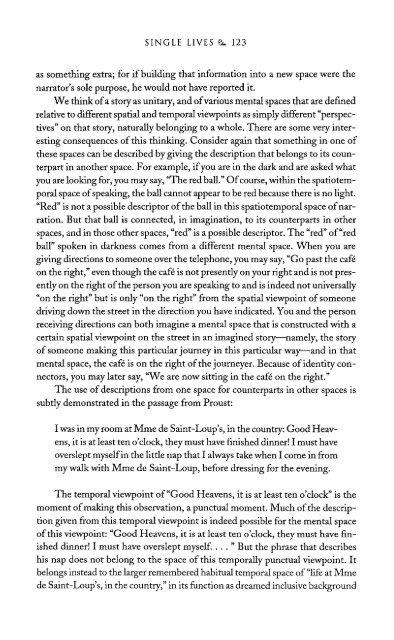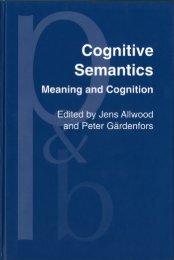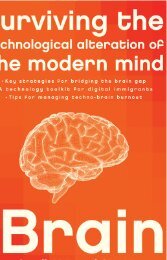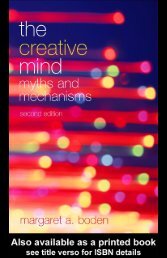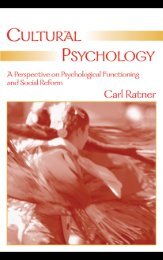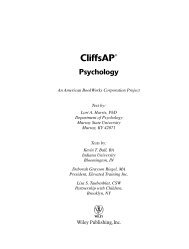The Literary Mind.pdf
The Literary Mind.pdf
The Literary Mind.pdf
You also want an ePaper? Increase the reach of your titles
YUMPU automatically turns print PDFs into web optimized ePapers that Google loves.
SINGLE LIVES 123<br />
as something extra; for if building that information into a new space were the<br />
narrator's sole purpose, he would not have reported it.<br />
We think of a story as unitary, and of various mental spaces that are defined<br />
relative to different spatial and temporal viewpoints as simply different "perspectives"<br />
on that story, naturally belonging to a whole. <strong>The</strong>re are some very interesting<br />
consequences of this thinking. Consider again that something in one of<br />
these spaces can be described by giving the description that belongs to its counterpart<br />
in another space. For example, if you are in the dark and are asked what<br />
you are looking for, you may say, "<strong>The</strong> red ball." Of course, within the spatiotemporal<br />
space of speaking, the ball cannot appear to be red because there is no light.<br />
"Red" is not a possible descriptor of the ball in this spatiotemporal space of narration.<br />
But that ball is connected, in imagination, to its counterparts in other<br />
spaces, and in those other spaces, "red" is a possible descriptor. <strong>The</strong> "red" of "red<br />
ball" spoken in darkness comes from a different mental space. When you are<br />
giving directions to someone over the telephone, you may say, "Go past the cafe<br />
on the right," even though the cafe is not presently on your right and is not presently<br />
on the right of the person you are speaking to and is indeed not universally<br />
"on the right" but is only "on the right" from the spatial viewpoint of someone<br />
driving down the street in the direction you have indicated. You and the person<br />
receiving directions can both imagine a mental space that is constructed with a<br />
certain spatial viewpoint on the street in an imagined story—namely, the story<br />
of someone making this particular journey in this particular way—and in that<br />
mental space, the cafe is on the right of the journeyer. Because of identity connectors,<br />
you may later say, "We are now sitting in the cafe on the right."<br />
<strong>The</strong> use of descriptions from one space for counterparts in other spaces is<br />
subtly demonstrated in the passage from Proust:<br />
I was in my room at Mme de Saint-Loup's, in the country: Good Heavens,<br />
it is at least ten o'clock, they must have finished dinner! I must have<br />
overslept myself in the little nap that I always take when I come in from<br />
my walk with Mme de Saint-Loup, before dressing for the evening.<br />
<strong>The</strong> temporal viewpoint of "Good Heavens, it is at least ten o'clock" is the<br />
moment of making this observation, a punctual moment. Much of the description<br />
given from this temporal viewpoint is indeed possible for the mental space<br />
of this viewpoint: "Good Heavens, it is at least ten o'clock, they must have finished<br />
dinner! I must have overslept myself. ..." But the phrase that describes<br />
his nap does not belong to the space of this temporally punctual viewpoint. It<br />
belongs instead to the larger remembered habitual temporal space of "life at Mme<br />
de Saint-Loup's, in the country," in its function as dreamed inclusive background


